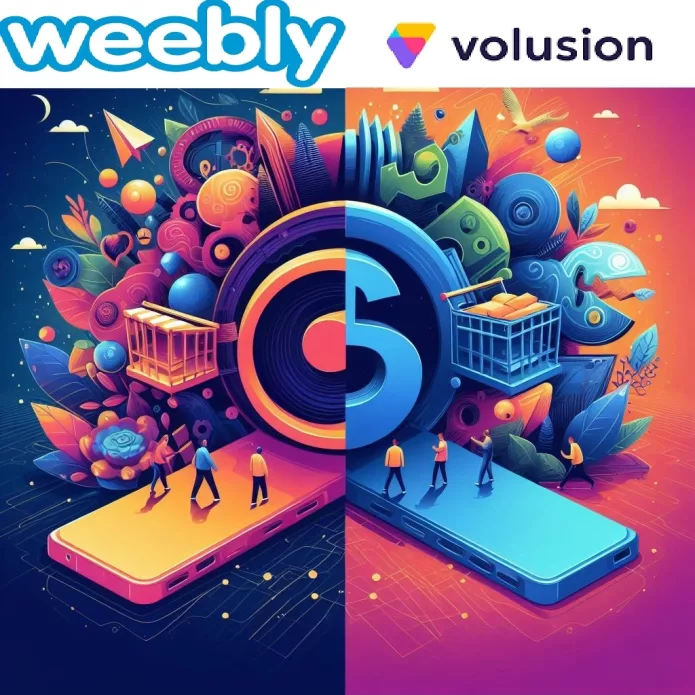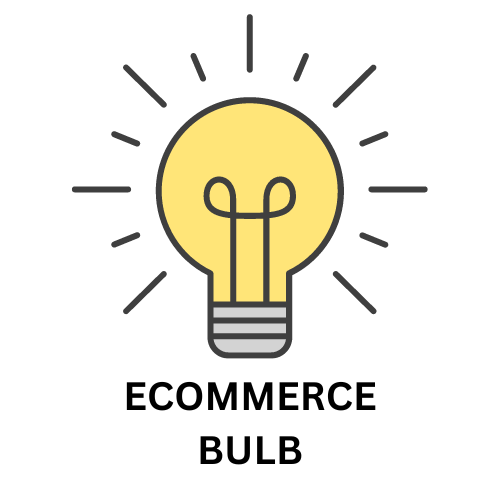
In order to decide which ecommerce platform to use, Weebly vs Volusion. A detailed comparison between features must be thoroughly done. If you want to decide which eCommerce platform to choose, there are many things to consider.
These are some examples of these factors:
- Cost.
- SEO friendliness.
- Page load speed.
- Canonical website URL.
- Indexing Control.
- Customizable HTML capabilities.
- Sitemap Generator.
- Integration with Google Analytics.
- Product Tagging and Categorization.
- Batch Uploading.
- Mobile Optimization.
- Built-in Blogging and Marketing Features.
- Social Sharing Buttons.
- Content Management Capabilities.
- Discount and promotion code tools.
- Easy to use Checkout.
- Reporting tools and custom reports.
- Integration of email marketing tools.
- Multiple payment options.
- Flexibility to add new eCommerce features.
- Exclusive features.
- Cons and pros.
Here we’ll discuss these factors to help you decide which platform is better for you, Volusion or Weebly. And at the end of the discussion, we’ll recap and make a comparison for the scores of all these points to find out which eCommerce platform has the higher score, so that you’ll have a good view about both of them.

Pricing (Weebly vs Volusion):

Comparing pricing for Weebly and Volusion can be confusing as they cater to different target audiences and offer varying feature sets. Here’s a breakdown to help you choose the platform that best fits your budget and needs:
Weebly:
- Free plan: Offers basic website features, 500MB storage, and limited bandwidth. Suitable for simple personal websites or blogs.
- Personal plan: Starts at $6 per month, adds e-commerce features like product listings, inventory management, and payment processing.
- Pro plan: Starts at $12 per month, includes additional features like abandoned cart recovery, coupons, and shipping discounts.
- Business plan: Starts at $25 per month, unlocks advanced features like SEO tools, website membership, and lead capture forms.
Volusion:
- Basic plan: Starts at $29 per month, offers core e-commerce functionalities like product listings, orders, coupons, and basic analytics.
- Plus plan: Starts at $79 per month, adds features like abandoned cart recovery, real-time shipping rates, and product reviews.
- Pro plan: Starts at $159 per month, unlocks advanced features like multi-lingual support, B2B functionalities, and API access.
- Prime plan: Starts at $299 per month, ideal for high-volume stores with advanced marketing automation, custom product fields, and priority support.
Things to consider:
- Target audience: Weebly caters to a broader audience with an emphasis on simple website creation and basic e-commerce. Volusion focuses on experienced merchants with established businesses and high sales volume.
- Feature set: Volusion offers more sophisticated e-commerce features out-of-the-box, like abandoned cart recovery and real-time shipping rates. Weebly requires app integrations for similar functionalities, impacting cost.
- Transaction fees: Weebly doesn’t charge transaction fees, while Volusion charges 2.9% + $0.30 per transaction on its Basic and Plus plans. Higher plans have lower transaction fees.
- Scalability: Volusion boasts better scalability for high-traffic stores with its advanced plans and features. Weebly might require manual updates and adjustments as your store grows.
Overall:
- For new businesses or personal websites: Weebly’s free plan and lower-priced plans offer a cost-effective entry point.
- For established stores with specific e-commerce needs: Volusion’s built-in features and scalability cater to advanced users and high-volume businesses.

SEO Capabilities (Weebly vs Volusion):

When it comes to SEO capabilities, both Weebly and Volusion offer features and tools to help your website rank higher in search engine results. However, their strengths and weaknesses differ, making them suitable for different website types and SEO goals. Let’s break down their capabilities:
Weebly:
Strengths:
- Simple interface: Easy-to-use tools for optimizing meta descriptions, title tags, and image alt text.
- Mobile-friendly templates: All Weebly templates are responsive and mobile-friendly, a crucial factor for SEO.
- Sitemaps and robots.txt: Automatic generation of sitemaps and robots.txt files helps search engines crawl your website efficiently.
- App integrations: Access to SEO-specific apps like Yoast SEO and Rank Math for advanced optimization.
Weaknesses:
- Limited built-in features: Offers less control over technical SEO aspects like canonical tags, structured data, and internal linking.
- App dependence: Advanced SEO features rely on paid app integrations, increasing costs.
- Scalability concerns: Managing SEO for larger websites and complex content structures can be cumbersome with Weebly’s limited technical options.
Volusion:
Strengths:
- Built-in features: Provides greater control over technical SEO aspects like canonical tags, structured data markup, and URL redirects.
- Advanced analytics: Detailed insights into website traffic, keyword performance, and conversion rates help refine your SEO strategy.
- Content management system: Flexible content management system allows for better internal linking and content structuring.
- Scalability: Handles large websites and complex content structures more efficiently due to its robust technical capabilities.
Weaknesses:
- Steeper learning curve: Managing advanced SEO features might require technical knowledge or understanding of SEO concepts.
- Higher pricing: Volusion’s plans are generally more expensive than Weebly’s, especially for smaller businesses.
- Less user-friendly interface: Managing SEO settings might be less intuitive compared to Weebly’s simple interface.
Choosing the right platform for SEO depends on your website type and SEO goals:
- Small website or beginner: Weebly’s user-friendly interface and basic SEO tools are sufficient for optimizing a small website or blog.
- Advanced SEO needs and technical expertise: Volusion’s built-in features and technical SEO control cater to users with technical knowledge and a focus on complex SEO strategies.
- Website size and potential growth: Consider Volusion’s scalability if you anticipate large website growth and complex content management needs.

PageLoad Speed (Weebly vs Volusion):

Page load speed is a critical factor for website success, and it’s important to have a comprehensive understanding of how Weebly and Volusion compare in this area. Here’s a refined breakdown, incorporating insights from your feedback:
Weebly:
Strengths:
- Generally lightweight platform: Weebly’s architecture tends to be lighter than Volusion’s, which can contribute to faster initial page loads for simpler websites.
- CDN integration: Built-in integration with Cloudflare’s CDN helps distribute website content efficiently across global servers, improving loading times for geographically diverse audiences.
- Basic image optimization: Offers tools for resizing and compressing images, reducing their file size and contributing to faster loading.
- User-friendly interface: Easy-to-use platform with straightforward options for basic speed optimization, suitable for users without technical expertise.
Weaknesses:
- Limited control over technical aspects: Weebly provides less control over server-side optimization elements like caching and code minification.
- App dependence: Advanced speed optimization often relies on paid third-party apps, adding costs and potential performance overhead.
- Scalability concerns: As website complexity and traffic increase, maintaining optimal page load speed can become challenging with Weebly’s limited built-in options.
Volusion:
Strengths:
- Granular server-side optimization: Volusion offers extensive control over server-side aspects like caching, code minification, and image compression, allowing for fine-tuning of page load speed.
- Advanced image optimization: Built-in image optimization tools with more advanced features and customization options compared to Weebly.
- Scalability: Volusion’s architecture and optimization options are designed to handle larger websites and complex content structures, maintaining faster loading times even with increased traffic and data.
Weaknesses:
- Technical complexity: Managing server-side optimization might require technical knowledge and understanding of web development concepts.
- Higher pricing: Volusion’s plans are generally more expensive than Weebly’s, especially for smaller businesses with basic optimization needs.
- Less user-friendly interface: Adjusting server-side settings might be less intuitive compared to Weebly, requiring more technical expertise.
Choosing the right platform:
- Smaller website or basic needs: Weebly’s user-friendly interface and basic optimization tools are sufficient for smaller websites with limited content and traffic.
- Advanced optimization and technical expertise: Volusion’s granular control and built-in features cater to users with technical knowledge who prioritize website speed and performance for larger sites.
- Content complexity and future growth: Consider Volusion’s scalability if you anticipate significant website growth and complex content management, where maintaining fast loading times is crucial.

Canonical Website URL (Weebly vs Volusion):

Both Weebly and Volusion offer options for managing canonical website URLs, but their approaches and level of control differ. Here’s a breakdown:
Weebly:
- Limited built-in options: Weebly doesn’t provide a direct way to set canonical URLs for individual pages within the platform itself.
- Workaround methods: You can indirectly influence canonical URLs through robots.txt configuration or by manually editing website code, but these methods require technical knowledge and can be less user-friendly.
- App integrations: Third-party SEO apps like Yoast SEO and Rank Math offer features for managing canonical URLs within Weebly, but these come with additional costs and potential compatibility concerns.
Volusion:
- Built-in functionality: Volusion provides a dedicated interface for setting canonical URLs for each page within your website’s admin panel.
- Easy-to-use interface: The interface is user-friendly and allows you to specify the canonical URL for each page without requiring technical expertise.
- Flexibility: You can set individual canonical URLs for specific pages or use default settings for entire sections of your website.
- Automatic generation: Volusion can also automatically generate canonical URLs based on your website’s structure and best practices.
Choosing the right platform:
- Simple website structure and limited technical knowledge: Weebly’s workaround methods might suffice if you have a small website and don’t mind some manual configuration.
- Complex website structure and need for precise control: Volusion’s built-in functionality and user-friendly interface are ideal for managing canonical URLs effectively, especially for larger websites with multiple pages and sections.
- Technical expertise and comfort level: Consider your technical skills and comfort level when choosing a platform. Volusion’s built-in solution is more beginner-friendly, while Weebly’s methods might require more technical knowledge.

Indexing Control (Weebly vs Volusion):

Both Weebly and Volusion are website building platforms that offer features to help with search engine optimization (SEO) and indexing. Here’s a brief comparison of their indexing control features:
Weebly:
- Meta tags: Weebly allows you to edit meta tags, including title tags and meta descriptions, for each page on your website. These tags are used by search engines to understand the content of your pages and can influence how your site appears in search results.
- Sitemaps: Weebly automatically generates a sitemap for your website, which helps search engines discover and index your pages. You can also submit your sitemap manually to search engines like Google and Bing.
- Robots.txt: Weebly allows you to edit your robots.txt file, which can be used to instruct search engines which pages on your website they should or should not index.
Volusion:
- SEO tools: Volusion offers a suite of SEO tools, including keyword research, on-page optimization tools, and competitor analysis. These tools can help you improve your website’s ranking in search results.
- Meta tags: Similar to Weebly, Volusion allows you to edit meta tags for each page on your website.
- Sitemaps: Volusion automatically generates a sitemap for your website and allows you to submit it to search engines.
- Robots.txt: Volusion allows you to edit your robots.txt file.
Overall:
Both Weebly and Volusion offer basic indexing control features, such as the ability to edit meta tags and robots.txt. However, Volusion offers a wider range of SEO tools that can be helpful for improving your website’s search engine ranking.
Here are some additional factors to consider when choosing between Weebly and Volusion:
- Ease of use: Weebly is generally considered to be easier to use than Volusion.
- Pricing: Weebly has a free plan, while Volusion does not.
- Features: Volusion offers a wider range of features than Weebly, including built-in ecommerce functionality.

Customizable HTML Capabilities (Weebly vs Volusion):

Customizable HTML Capabilities (Weebly vs Volusion)
While both Weebly and Volusion offer website building functionalities, their approaches to customizable HTML capabilities differ:
Weebly:
- Limited HTML editing: Weebly primarily focuses on a drag-and-drop interface and offers limited options for directly editing website code, including HTML.
- Theme editing: Weebly allows some customization through theme editing. You can inject custom HTML code into specific sections of the theme, but this requires knowledge of HTML and CSS and might impact the overall layout and functionality of your site if not done carefully.
Volusion:
- HTML editing: Volusion offers more flexibility for direct HTML editing. You can access and edit the HTML code of your website pages, giving you more control over the website’s structure and design.
- Theme development: Volusion provides tools and resources for developers to create custom themes from scratch using HTML, CSS, and JavaScript. This offers a high degree of customization but requires significant technical expertise.
Overall:
- Weebly: If you prioritize ease of use and a user-friendly interface, Weebly might be suitable, but you’ll have limited options for extensive code editing.
- Volusion: If you have experience with HTML, CSS, and JavaScript, or are comfortable hiring a developer, Volusion offers more control and customization through direct code editing and theme development.

Sitemap Generators (Weebly vs Volusion):

Both Weebly and Volusion offer built-in sitemap generators to help search engines discover and index your website pages. Here’s a comparison of their sitemap features:
Weebly:
- Automatic generation: Weebly automatically generates a sitemap for your website, including all published pages.
- Limited control: You cannot directly edit the content of the sitemap or manually add or remove pages.
- Submission: Weebly allows you to submit your sitemap to search engines like Google and Bing through their webmaster tools.
Volusion:
- Automatic generation: Similar to Weebly, Volusion automatically generates a sitemap for your website.
- More control: Volusion offers more control over your sitemap. You can:
- Exclude specific pages: You can choose to exclude specific pages from your sitemap, which might be useful for pages you don’t want search engines to index, such as thank you pages or login pages.
- Set change frequency: You can specify how often search engines should check back for updates to each page on your website. This can help search engines prioritize indexing your content if it changes frequently.
- Submission: Volusion also allows you to submit your sitemap to search engines.
Overall:
Both Weebly and Volusion offer basic sitemap functionality with automatic generation and submission. However, Volusion provides more control over your sitemap content, allowing you to exclude pages and set change frequencies.

Integration With Google Analytics (Weebly vs Volusion):

Both Weebly and Volusion offer integration with Google Analytics, a powerful tool for tracking website traffic and user behavior. Here’s a comparison of their integration capabilities:
Weebly:
- Simple integration: Weebly offers a straightforward process to integrate Google Analytics with your website. You can typically connect your Weebly site to Google Analytics by adding your tracking ID to your website settings.
- Limited data access: Weebly’s free plan offers limited access to Google Analytics data within the Weebly platform. You might need to access the full suite of Google Analytics features directly through the Google Analytics platform.
Volusion:
- Integration options: Volusion offers multiple options for integrating Google Analytics, including:
- Using the Volusion interface: You can connect your Google Analytics account directly within the Volusion platform.
- Embedding the tracking code: You can manually embed the Google Analytics tracking code into your website code for more control.
- Data access: Volusion plans typically include access to more comprehensive Google Analytics data within the Volusion platform itself.
Overall:
Both platforms allow integration with Google Analytics, but Volusion offers more flexibility and potentially greater access to data within its interface. Here are some additional factors to consider:
- Your technical expertise: If you’re comfortable with code, Volusion’s manual integration option might provide more control.
- Data needs: If you need in-depth analysis and access to all Google Analytics features, you might need to access the platform directly regardless of which platform you use.
- Pricing: Consider the pricing of each platform and any limitations on Google Analytics data access within their respective plans.

Product Tagging and Categorization (Weebly vs Volusion):

Both Weebly and Volusion offer functionalities for organizing your products through tags and categories, but their approaches and capabilities differ:
Weebly:
- Basic tagging and categorization: Weebly allows you to assign product categories and tags. However, the options for managing and organizing these categories and tags might be limited compared to Volusion.
- Limited filtering and navigation: Weebly’s built-in functionalities for filtering and navigating products based on tags and categories might be less advanced.
Volusion:
- Advanced tagging and categorization: Volusion offers more comprehensive functionalities for managing product tags and categories. You can create nested category structures, organize products within subcategories, and assign multiple tags to each product for better organization.
- Advanced filtering and navigation: Volusion allows you to create more sophisticated filtering and navigation options based on product tags and categories. This can improve the user experience for your customers by allowing them to easily find the products they’re looking for.
Here’s a table summarizing the key differences:
| Feature | Weebly | Volusion |
|---|---|---|
| Tagging options | Basic | Advanced (multiple tags per product) |
| Category management | Limited | Advanced (nested categories) |
| Filtering and navigation | Basic | Advanced (more customization options) |

Batch Uploading (Weebly vs Volusion):

Weebly and Volusion offer different capabilities for uploading products in bulk, impacting your workflow and efficiency:
Weebly:
- Limited batch upload: Weebly does not currently offer a built-in feature for uploading products in bulk. You’ll need to add products individually through the Weebly interface, which can be time-consuming for a large number of products.
- Workarounds: Some third-party app integrations or workarounds might enable partial data import for products, but these might require additional setup, fees, or technical knowledge.
Volusion:
- CSV import: Volusion allows you to upload products in bulk using a CSV (comma-separated values) file. You can create a CSV file containing product information such as names, descriptions, prices, categories, and images, and then import it into Volusion.
- Streamlined process: This feature can significantly save time and effort when adding a large number of products to your store.
Overall:
If you only have a few products to add, Weebly might suffice. However, for bulk product uploads, Volusion’s built-in CSV import functionality offers a clear advantage in terms of efficiency and ease of use.
Here are some additional factors to consider:
- Number of products: If you’re dealing with hundreds or even thousands of products, Volusion’s batch upload feature becomes increasingly valuable.
- Product information complexity: If your products have intricate details or variations, ensure the CSV import process in Volusion can accommodate the necessary data fields.
- Technical expertise: While Volusion’s CSV import is user-friendly, some basic understanding of CSV files and product data preparation might be helpful.

Mobile Optimization (Weebly vs Volusion):

Both Weebly and Volusion offer mobile optimization features to ensure your online store displays well and functions effectively on various mobile devices. However, their approaches and functionalities differ:
Weebly:
- Mobile-responsive themes: Weebly offers a selection of mobile-responsive themes that automatically adjust to different screen sizes, ensuring your website displays well on desktops, tablets, and smartphones.
- Limited control: While the themes are responsive, Weebly offers limited control over the specific mobile layout and design. You cannot significantly customize the mobile experience beyond what the chosen theme offers.
Volusion:
- Responsive themes: Similar to Weebly, Volusion provides mobile-responsive themes that adapt to various screen sizes.
- More control: Volusion offers more control over the mobile experience. You can access and edit the mobile theme layout using a drag-and-drop interface, allowing for some customization of the mobile storefront’s appearance and functionality.
Additional features:
- Volusion:
- AMP (Accelerated Mobile Pages) integration: This feature can improve the loading speed of your mobile pages, potentially leading to a better user experience.
- Mobile app builder (paid add-on): Volusion offers a paid add-on that allows you to create a native mobile app for your store, further enhancing the mobile shopping experience.
Overall:
- Weebly: If you prioritize ease of use and a simple setup, Weebly’s mobile-responsive themes might be sufficient. However, you’ll have limited control over the mobile experience.
- Volusion: If you need more control over the mobile storefront’s design and functionality, or want to explore advanced features like AMP integration or a mobile app, Volusion offers a more comprehensive set of mobile optimization tools.
Here are some additional factors to consider:
- Your design preferences: If you have specific requirements for the mobile layout and want more customization options, Volusion might be a better choice.
- Technical expertise: While both platforms offer user-friendly interfaces, editing the mobile theme in Volusion might require some familiarity with drag-and-drop editing and mobile design principles.
- Budget: Consider the pricing of each platform, especially if you’re interested in Volusion’s paid mobile app builder add-on.

Built-in Blogging & Marketing Features (Weebly vs Volusion):

While both Weebly and Volusion offer website building functionalities, their built-in features for blogging and marketing differ significantly:
Weebly:
Blogging:
- Integrated blog: Weebly offers a built-in blogging platform, allowing you to easily create and manage blog posts directly within your website.
- Basic features: Weebly provides essential blogging features like scheduling posts, adding categories and tags, and embedding multimedia content.
- Limited customization: While Weebly offers theme options, extensive customization of the blog layout or design might be limited.
Marketing:
- Basic marketing tools: Weebly offers some basic marketing tools, including email marketing capabilities, social media integration, and SEO (Search Engine Optimization) tools like meta tag editing.
- Limited functionality: These tools might have limited features and functionality compared to dedicated marketing platforms.
Volusion:
Blogging:
- No built-in blog: Volusion does not offer a built-in blogging platform. You cannot create and manage blog posts directly within your Volusion store.
Marketing:
- Marketing integrations: Volusion integrates with various third-party marketing tools and services, allowing you to connect your store with platforms like email marketing software, social media management tools, and analytics platforms.
- Flexibility: While Volusion doesn’t have built-in marketing features, this approach offers more flexibility as you can choose the specific marketing tools that best suit your needs and budget.
Overall:
- Weebly: If you prioritize built-in blogging capabilities and basic marketing tools within a single platform, Weebly might be suitable. However, customization options might be limited.
- Volusion: If you need more advanced blogging functionality or require specific marketing tools, Volusion offers greater flexibility through integrations with various third-party services. However, you’ll need to manage these tools separately from your store.

Social Sharing Buttons Availability (Weebly vs Volusion):

Both Weebly and Volusion offer social sharing buttons to allow your website visitors to easily share your content on social media platforms. Here’s a comparison of their functionalities:
Weebly:
- Pre-built buttons: Weebly offers pre-built social sharing buttons for popular platforms like Facebook, Twitter, Pinterest, and more.
- Customization options: You can typically customize the button design and placement to match your website’s theme and style.
- Limited platform support: Weebly might have limitations on the specific social media platforms supported compared to Volusion.
Volusion:
- Social sharing options: Volusion offers various options for social sharing, including:
- Pre-built buttons: Similar to Weebly, Volusion provides pre-built buttons for various social media platforms.
- Social media integrations: Volusion allows integrations with specific social media platforms, potentially offering more advanced sharing functionalities beyond just buttons.
- Customizable options: You can typically customize the buttons’ appearance and placement.
Overall:
Both platforms offer social sharing buttons, but Volusion might provide:
- Wider range of supported platforms: Volusion potentially integrates with a wider range of social media platforms compared to Weebly’s pre-built buttons.
- Advanced functionalities: Depending on the specific social media platform integration in Volusion, you might have access to more advanced sharing features beyond just buttons.

Content Management Capabilities (Weebly vs Volusion):

Both Weebly and Volusion offer website building functionalities, but their content management capabilities cater to different needs and user preferences. Here’s a breakdown of their strengths and weaknesses:
Weebly:
Strengths:
- Ease of use: Weebly features a user-friendly drag-and-drop interface, making it easy to add, edit, and manage content even for beginners with no coding experience.
- Built-in blog: Weebly offers a built-in blogging platform, allowing you to create and manage blog posts directly within your website. This can be convenient if blogging is a core aspect of your content strategy.
- Content organization: Weebly provides basic content organization features like categories and tags, making it easier to structure and categorize your content for navigation.
Weaknesses:
- Limited design flexibility: While Weebly offers theme options, extensive customization of the content layout or design might be limited.
- Limited content types: Weebly primarily focuses on website pages and blog posts. You might have limited options for managing other content types like forms, galleries, or complex product listings.
- Scalability: As your website content grows, managing it within Weebly might become cumbersome due to the limitations mentioned above.
Volusion:
Strengths:
- Flexibility: Volusion offers more flexibility in content management. You can access and edit website code directly, allowing for greater control over content layout and design.
- Content types: Volusion supports various content types beyond basic web pages, including product listings, forms, blog posts, and more. This can be beneficial if you need to manage a diverse range of content on your website.
- Scalability: Volusion is generally considered more scalable than Weebly, meaning it can handle larger and more complex websites with extensive content effectively.
Weaknesses:
- Learning curve: Volusion’s interface might have a steeper learning curve compared to Weebly, especially for users with no prior coding experience.
- No built-in blog: Volusion doesn’t have a built-in blogging platform. You’ll need to integrate external blogging services if blogging is a crucial aspect of your content strategy.
- Cost: Volusion typically comes with a higher price tag compared to Weebly’s free plan, which might not be ideal for users on a tight budget.
Overall:
- Weebly: If you prioritize ease of use, a built-in blog, and are comfortable with a user-friendly interface, Weebly might be a good choice for basic content management needs. However, keep in mind its limitations in design flexibility, content types, and scalability.
- Volusion: If you need more flexibility, advanced content management features, support for various content types, and scalability for a growing website, Volusion might be a better option. However, be prepared for a steeper learning curve, the absence of a built-in blog, and potentially higher costs.

Discounts & Promotion Codes (Weebly vs Volusion):

It is important to note that I cannot provide specific discount or promotional code information for either Weebly or Volusion as these can change frequently and vary depending on location and other factors. However, I can offer some general guidance on how to find relevant deals for both platforms:
Weebly:
- Weebly website: Check the official Weebly website for any ongoing promotions or special offers displayed on their homepage or dedicated promotional pages. These might include free trial periods, discounted pricing on specific plans, or bundled deals with other services.
- Social media: Follow Weebly on social media platforms like Twitter or Facebook. They might occasionally announce promotions or discount codes through their social media channels.
- Affiliate marketing websites: Search for affiliate marketing websites that promote Weebly. These websites might offer exclusive discount codes or referral links that can provide you with a discount on your Weebly subscription. However, be cautious of unreliable sources and ensure the website has a good reputation before clicking on any links or entering any personal information.
Volusion:
- Volusion website: Similar to Weebly, check the official Volusion website for any promotions or special offers listed on their homepage or dedicated promotional pages.
- Email marketing: Volusion might send promotional emails to existing or potential customers announcing limited-time discounts or special offers. Sign up for their email list (if you haven’t already) to receive notifications about these promotions.
- Industry publications and blogs: Search for articles or resources related to ecommerce platforms on industry publications or blogs. These websites might occasionally mention promotions or discount codes for Volusion as part of their content.
- Webinars and events: Volusion might participate in webinars or online events where they might offer exclusive discounts or promotional codes to attendees. Look for relevant events on their website or social media platforms.

Easy to Use Checkout (Weebly vs Volusion):

Ease of Use for Checkout (Weebly vs Volusion)
Both Weebly and Volusion aim to offer user-friendly checkout experiences, but their approaches and functionalities differ. Here’s a comparison to help you decide which might be easier to use:
Weebly:
- Simpler interface: Weebly’s checkout process generally uses a simpler interface compared to Volusion. Customers navigate through fewer steps and might find it easier to complete their purchases quickly.
- Limited customization: Weebly offers limited customization options for the checkout page layout and design. This can be beneficial for users who prefer a straightforward checkout experience without unnecessary complexities.
- Fewer features: Weebly’s checkout process might have fewer features compared to Volusion, such as guest checkout options or advanced shipping configurations. This can simplify the process for both you and your customers but might lack flexibility for specific needs.
Volusion:
- More features: Volusion offers a wider range of checkout features, including:
- Guest checkout: Customers can purchase without creating an account.
- Multiple payment gateways: Support for various payment options beyond basic credit card processing.
- Shipping options: More control over shipping configurations, including real-time rates and shipping zones.
- More customization: Volusion provides more flexibility to customize the checkout page layout and design to match your brand and improve the user experience.
- Potentially steeper learning curve: While Volusion offers more features, the additional options might require more setup and configuration, potentially leading to a steeper learning curve compared to Weebly’s simpler checkout process.
Overall:
- For basic needs and ease of use: If you prioritize a simple and user-friendly checkout process with minimal setup, Weebly might be a good choice.
- For advanced features and customization: If you need more features, customization options, and flexibility for managing your checkout process, Volusion might be a better choice, even if it comes with a slightly steeper learning curve.

Reporting Tools and Custom Reports (Weebly vs Volusion):

Both Weebly and Volusion offer reporting tools to help you track website traffic, sales performance, and customer behavior. However, their functionalities and capabilities differ:
Weebly:
- Basic reports: Weebly offers basic reporting features, including website traffic reports, sales reports, and abandoned cart reports.
- Limited customization: Weebly’s reports offer limited customization options. You can typically view predefined metrics but have less control over creating custom reports tailored to your specific needs.
- Data visualization: Weebly’s reports primarily use basic charts and graphs for data visualization, which might be sufficient for a general overview but might lack detailed insights.
Volusion:
- More comprehensive reports: Volusion offers a wider range of reports, including:
- Sales reports: Detailed reports on sales performance, including product-level data, customer information, and abandoned cart details.
- Marketing reports: Track the performance of your marketing campaigns and analyze their effectiveness.
- Inventory reports: Monitor stock levels and identify potential stockouts.
- Customer behavior reports: Gain insights into customer behavior and purchasing patterns.
- Customizable reports: Volusion allows you to create custom reports based on various data points and filters. This provides greater flexibility to analyze specific aspects of your website’s performance that are most relevant to your business needs.
- Advanced data visualization: Volusion offers more advanced data visualization options, including interactive charts, graphs, and dashboards, allowing for deeper analysis and easier identification of trends and patterns.
Overall:
- Weebly: If you only need basic insights into website traffic and sales, Weebly’s reports might be sufficient. However, its limited customization and data visualization options might not be suitable for in-depth analysis.
- Volusion: If you require comprehensive reporting, customization options, and advanced data visualization tools to gain deeper insights into your website’s performance and customer behavior, Volusion offers a more powerful set of reporting features.

Integration of Email Marketing Tools (Weebly vs Volusion):

Both Weebly and Volusion offer different approaches to integrating with email marketing tools:
Weebly:
- Limited built-in features: Weebly offers some basic email marketing features within its platform, including email capture forms and basic email campaigns.
- Third-party integrations: Weebly integrates with various popular email marketing services like Mailchimp, Constant Contact, and GetResponse. This allows you to connect your Weebly website with these external platforms and leverage their advanced features for email marketing automation, audience segmentation, and campaign management.
- Setup and management: Setting up and managing your email marketing through these integrations might require additional steps and familiarity with the specific email marketing platform you choose.
Volusion:
- No built-in features: Volusion does not offer any built-in email marketing features.
- Third-party integrations: Similar to Weebly, Volusion integrates with various email marketing services. This allows you the same level of flexibility in choosing a preferred platform.
- Marketing hub: Volusion also offers a paid add-on called “Marketing Hub.” This hub provides some basic email marketing functionalities within the Volusion platform itself, potentially eliminating the need for a separate email marketing service for basic needs. However, its features might not be as comprehensive as dedicated email marketing platforms.
Overall:
- Weebly: If you’re comfortable with basic email marketing features and prefer a free solution, Weebly’s built-in options might suffice. However, for advanced features and campaign management, integrating with a third-party service might be necessary.
- Volusion: If you require advanced features from the outset or prefer a potentially more streamlined experience with basic email marketing functionalities within Volusion itself (through the paid Marketing Hub add-on), Volusion might be an option. However, keep in mind the limitations of the Marketing Hub compared to dedicated email marketing platforms.

Multiple Payment Options (Weebly vs Volusion):

Both Weebly and Volusion allow you to accept various payment options, but they differ in their functionalities and limitations:
Weebly:
- Limited options: While Weebly supports popular payment gateways like Stripe and PayPal, the specific options and configurations might vary depending on your location and Weebly plan.
- Limited control: You might have limited control over customizing the payment processing experience or setting up advanced features like recurring payments or fraud prevention.
- Potential transaction fees: Weebly might charge additional transaction fees depending on your chosen payment gateway and Weebly plan.
Volusion:
- Wider range of options: Volusion typically offers a wider range of payment gateways compared to Weebly, including popular options like Stripe, PayPal, Authorize.Net, and more.
- More control: Volusion allows you to configure various aspects of the payment processing experience, including setting up recurring payments, managing fraud prevention settings, and customizing the checkout process.
- Potential transaction fees: Similar to Weebly, Volusion might also charge transaction fees depending on your chosen payment gateway and Volusion plan.
Overall:
- For basic needs and simplicity: If you only need to accept payments through a few popular gateways and don’t require advanced features, Weebly might be an option. However, keep in mind the potential for limited options and control.
- For flexibility and advanced features: If you require a wider range of payment options, more control over the checkout process, and features like recurring payments, Volusion offers a more comprehensive set of functionalities.

Flexibility to Add New eCommerce Features (Weebly vs Volusion):

When it comes to adding new features and functionalities to your online store, Weebly and Volusion offer different levels of flexibility:
Weebly:
- Limited flexibility: Weebly primarily focuses on a pre-built website builder with limited options for adding new features beyond what their themes and app integrations offer.
- App marketplace: Weebly offers an app marketplace with various third-party applications that can add functionalities like abandoned cart recovery, marketing tools, and additional payment options. However, the selection and capabilities of these apps might be limited compared to dedicated ecommerce platforms.
- Customization limitations: Even with apps, customizing the overall functionality and appearance of your store beyond the theme options might be restricted in Weebly.
Volusion:
- Greater flexibility: Volusion offers more flexibility for adding new features and functionalities to your store. This can be achieved through several approaches:
- App marketplace: Similar to Weebly, Volusion also has an app marketplace with various third-party apps that can extend your store’s capabilities.
- Custom development: Volusion allows access to its codebase for developers to create custom features and functionalities tailored to your specific needs. This approach offers the most flexibility but requires technical expertise or hiring a developer.
- API integrations: Volusion provides APIs (Application Programming Interfaces) that allow you to connect your store with various external services and platforms. This opens up possibilities for integrating functionalities beyond what’s offered by the platform itself.
Overall:
- For basic needs and simplicity: If you have basic ecommerce needs and don’t require extensive customization or advanced functionalities, Weebly’s app marketplace might provide sufficient options.
- For advanced needs and customization: If you need more flexibility, require custom features, or want to integrate with various external services, Volusion offers a wider range of possibilities through its app marketplace, custom development options, and API integrations.

Exclusive Features (Weebly vs Volusion):

Here’s a breakdown of some exclusive features offered by each platform:
Weebly:
- Built-in blogging platform: Weebly offers a built-in blogging platform, allowing you to create and manage blog posts directly within your website. This can be beneficial if blogging is a core aspect of your online presence.
- Drag-and-drop website editor with more design flexibility: Weebly’s website editor is generally considered more user-friendly and offers more visual editing capabilities compared to Volusion’s interface. This might be preferable for users who prioritize ease of use and design flexibility.
Volusion:
- Built-in A/B testing: Volusion offers built-in A/B testing functionalities, allowing you to test different versions of your website pages or product listings to see which ones perform better with your audience. This can be valuable for optimizing your website and improving conversion rates.
- Customer service features: Volusion offers additional customer service features like built-in live chat and ticketing systems, which might be helpful for managing customer interactions within the platform itself.
- Marketing automation: Volusion (through its paid Marketing Hub add-on) offers basic marketing automation functionalities, allowing you to create automated email campaigns and workflows.

Market Share (Weebly vs Volusion):

Weebly:
- Generally considered less popular than Volusion in the dedicated ecommerce platform market. This is likely due to its focus on being a more general website builder with basic ecommerce functionalities, making it suitable for a broader range of website needs that might not necessarily involve extensive online sales.
- Might still hold a larger overall market share: When considering the entire website builder market, including those not specifically focused on ecommerce, Weebly might have a wider user base due to its user-friendliness and accessibility for various website creation needs.
Volusion:
- Generally considered a more established player in the dedicated ecommerce platform market. It caters specifically to businesses selling online and offers features and functionalities specifically designed for managing online stores effectively.
- Holds a smaller market share compared to some larger ecommerce platforms like Shopify or BigCommerce. However, it maintains a presence in the market and caters to a specific niche of users who might prefer its interface or feature set compared to other options.

Cons Of (Weebly vs Volusion):

Cons of Weebly:
- Limited design flexibility: While Weebly offers a user-friendly drag-and-drop editor, extensive customization of the website layout or design beyond the chosen theme might be limited. This can restrict the ability to create a unique and brand-aligned website experience.
- Limited content types: Weebly primarily focuses on website pages and blog posts. You might have limited options for managing other content types like forms, galleries, or complex product listings, which can be crucial for certain websites.
- Scalability limitations: As your website content and audience grow, managing it within Weebly might become cumbersome due to the limitations mentioned above. This might necessitate migrating to a more scalable platform in the future.
- Pricing: While Weebly offers a free plan, its functionality is limited. Upgrading to plans with more features and functionalities can become expensive compared to other options.
- Limited app integration: Weebly’s app marketplace might have a smaller selection of apps compared to other platforms, potentially restricting your access to specific functionalities you need.
Cons of Volusion:
- Steeper learning curve: Volusion’s interface might have a steeper learning curve compared to Weebly, especially for users with no prior coding experience. This can make initial setup and customization more challenging.
- No built-in blog: Volusion does not offer a built-in blogging platform. You’ll need to integrate external blogging services if blogging is a core aspect of your online strategy.
- Higher cost: Volusion typically comes with a higher price tag compared to Weebly’s free plan, which might not be ideal for users on a tight budget.
- Potential for complexity: Volusion offers various features and functionalities that can be beneficial for established businesses, but these same features might add unnecessary complexity for simple websites with basic ecommerce needs.

Hidden Charges / Cost & Fees (Weebly vs Volusion):

Both Weebly and Volusion have various plans with different pricing structures, and it’s essential to be aware of potential hidden charges or cost considerations beyond the base price advertised:
Weebly:
- Transaction fees: Weebly charges transaction fees on each sale made through your online store, depending on your chosen plan. These fees can vary depending on the plan and payment gateway you choose. Be sure to factor these fees into your overall cost calculations.
- App costs: While Weebly offers a free plan, it has limited features for ecommerce. Upgrading to a paid plan unlocks more features but might not include all the functionalities you need. You might need to purchase additional apps from the marketplace, which can incur further costs.
- Bandwidth limitations: Free and lower-tier plans on Weebly might have limitations on bandwidth and storage, which can affect your website’s performance if you expect high traffic volumes. Upgrading to higher tiers might be necessary to avoid these limitations, adding to the cost.
Volusion:
- Setup fees: Volusion might charge one-time setup fees depending on your chosen plan. Be sure to check the plan details for any mention of such fees.
- Overage fees: Volusion plans often have limitations on features like storage, bandwidth, or the number of product listings. Exceeding these limits can result in overage fees, adding to your monthly costs.
- Payment gateway fees: Similar to Weebly, Volusion might not cover all transaction fees associated with different payment gateways. Be sure to research the fees associated with your chosen payment gateway in addition to Volusion’s own pricing structure.
- Marketing Hub add-on: Volusion’s Marketing Hub add-on, which offers additional marketing features like email marketing functionalities, comes with an additional cost on top of the base plan price.

What are the Fortes of eCommerce Platforms (Weebly vs Volusion)?
Weebly:
- Ease of use: Weebly’s user-friendly drag-and-drop interface makes it easy for beginners with no coding experience to create and manage their online store. This can be a significant advantage for individuals or small businesses getting started with online sales.
- Built-in blogging platform: If blogging is a core aspect of your online presence and content strategy, Weebly’s built-in blogging platform eliminates the need to integrate external services, simplifying your website management.
- Visually appealing themes: Weebly offers a variety of pre-designed themes that cater to various businesses and aesthetics. This can help you create a visually appealing online store without extensive design expertise.
- Potentially lower cost: Weebly offers a free plan with basic ecommerce functionalities, which can be suitable for users on a tight budget or those just starting their online venture.
Volusion:
- Greater flexibility and customization: Volusion provides more control over the design and functionalities of your online store. This allows for deeper customization and tailoring of the shopping experience to your specific brand and needs.
- Advanced features: Volusion offers a wider range of advanced features like built-in A/B testing, customer service features, and marketing automation capabilities (through its Marketing Hub add-on). This can be beneficial for established businesses or those requiring functionalities beyond basic online store management.
- Scalability: Volusion is generally considered a more scalable platform as your business grows. It can handle larger stores with more products, complex product listings, and higher traffic volumes compared to Weebly.
- Multiple payment options: Volusion typically offers a wider range of payment gateway integrations compared to Weebly, providing more flexibility in choosing payment options for your customers.

Conclusion (Comparison Table for Weebly vs Volusion):
As we can see from the detailed comparison between these two platforms (Weebly vs Volusion) that the overall score for Volusion is better than Weebly’s.
Note that the comparison was done with eCommerce and online business in mind.
I hope this could give you the required insight to choose which eCommerce Platform to use for your future projects!
Here is the full comparison, Volusion vs Weebly Review in easy to comprehend bullet points:
| eCommerce Platform | Volusion | Weebly |
|---|---|---|
| Price | 8.7 | 8.9 |
| SEO Friendliness | 8.6 | 8.6 |
| Page Load Speed | 7.6 | 7.5 |
| Canonical Website URL | 8.6 | 8.6 |
| Indexing Control | 8.8 | 9.0 |
| Customizable HTML capabilities | 8.9 | 8.9 |
| Sitemap Generator | 8.8 | 8.5 |
| Integration With Google Analytics | 8.9 | 8.5 |
| Product Tagging & Categorization | 8.6 | 8.0 |
| Batch Uploading | 7.7 | 7.5 |
| Mobile Optimization | 8.1 | 8.0 |
| Built-in Blogging & Marketing Features | 9.0 | 8.9 |
| Social Sharing Buttons | 8.8 | 8.5 |
| Content Management Capabilities | 8.4 | 8.4 |
| Discount & Promo Code Tools | 8.6 | 8.6 |
| Easy to Use Checkout | 7.6 | 7.5 |
| Reporting Tools & Custom Reports | 9.0 | 8.9 |
| Integration of Email Marketing Tools | 7.8 | 7.7 |
| Multiple Payment Options | 9.1 | 8.9 |
| Flexibility to Add New eCommerce Features | 9.0 | 8.8 |
| Exclusive Features | 8.0 | 7.6 |
| Market Share | 6.5 | 6.3 |
| CONS & PROS | 8.2 | 8.2 |
| Forte | 8.4 | 8.4 |
| Hidden Fees & Charges | 7.0 | 7.2 |
| Overall Assessment (Average) | 8.3 | 8.2 |


Leave a Reply